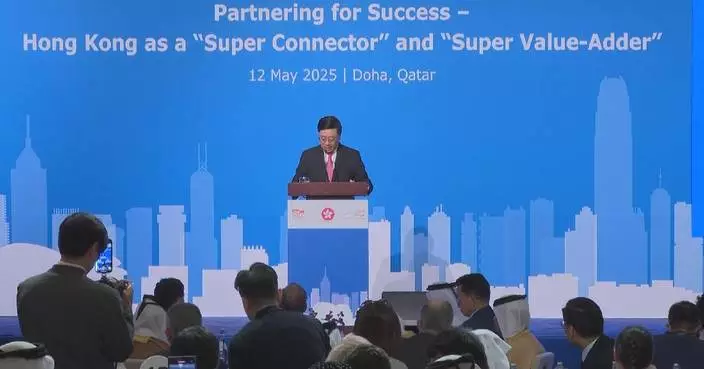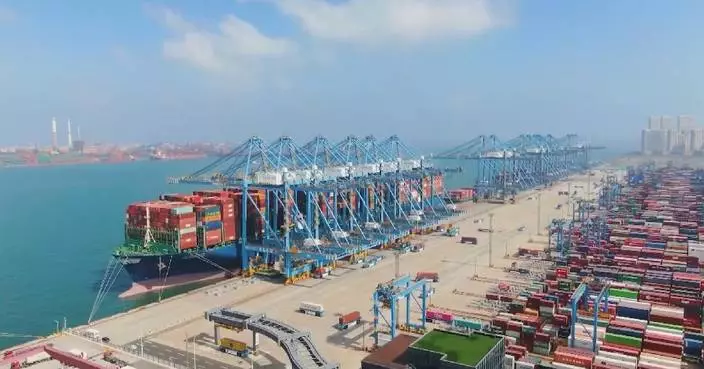China's Generation Z is driving a new and unique consumption trend, with animation, comics, and gaming merchandise that hold the special emotional value gaining increasing popularity among young people.
"Guzi" in Chinese, or "goods" in English, is a general term for animation, comic and gaming products, including blind boxes, badges and dolls of virtual characters.
According to China Insights Consultancy, the ACG economy in China has surged to about 170 billion yuan (23 billion U.S. dollars) in 2024, and its overall market size is expected to reach 300 billion yuan (43 billion U.S. dollars) by 2029.
Currently, animation, comics, and games have become some of the hottest topics among Chinese young people, with related merchandise serving as a form of "currency" for them.
Qian Yitong, a college student, also an enthusiastic comic and gaming fan, said these products provide her with spiritual comfort.
"I'm in exam week now. As soon as I wake up every day, I start studying. So I come here specially to admire these beautiful goods and relieve my stress," she said at a "Guzi" store in Beijing.
According to Qian, almost half of her friends are also animation, comic and gaming lovers. They watched cartoons when they were kids, and read comics and played video games when they got a bit older.
"Many of my classmates bought dolls made of anime characters and put them in front of them when studying in the library to give themselves spiritual strength," she added.
From a psychological perspective, experts said paying for emotional comfort reflects changes in Chinese consumption trends among young people.
"The qualities of animation, comic and gaming characters, such as their toughness and bravery, also give them spiritual power. The wonderful memories and companionship of physical goods can strengthen that feeling. Common hobbies can also easily expand the social circle of young people, which is beneficial for mental health," said psychologist Zhang Manyu.
Many big cities in China, such as Beijing, Shanghai and Chengdu, are now treating the animation, comic and gaming industry as an engine for economic growth by creating commercial complexes that attract young people to shop offline.

China's Generation Z drives new consumption trends in animation, comics, gaming merchandise
A toy shop owner in Los Angeles is worried playtime could be over for his business as the uncertainty brought by the Trump administration's tariff measures continues to disrupt supply chains and risks scaring away customers with higher prices.
Like many small U.S. businesses operators, Louis Calderon, who has been running Big Lou's Toys and Collectibles in Los Angeles for over 30 years, has been anxiously watching news reports as he looks for the latest updates about the unpredictable tariff situation.
Calderon said he has been carefully managing his overall purchases and doing all he can to pass down only the bare minimum of the cost increases to customers as he tries to protect his business from the uncertainty.
"All my distributors already told me that everything is going to go up in price. So, I have to be smart [about] what I buy and what I don't buy. I try to carry everything, but with tariffs going up - I try to be the lowest price possible, but I'm going to have to raise my prices, which is a bummer," he said.
Despite Calderon's best efforts, the reality is that price-sensitive customers are having to cut their overall spending, meaning it becomes increasingly unviable to splash the cash on non-essential items like toys.
"You know, the wages are not that high up here. It will be a little hiccup, yeah, it'll be a little hard because prices, they're already high," said Stephen Perez, a customer.
Though he has come through economic hardships in the past, Calderon said the current tariff turmoil has him worrying about the worst case scenario. He said the potential closure of his toy store means not only losing his source of income but will also destroy the long-standing connection he has established with loyal customers over the past three decades.
"I think that's the one thing that I'm worried about if we ever do close because of this, which hopefully won't happen -- I'm going to miss the interaction with people and how they come in here and they see their childhood. Honestly, that's what I'm going to miss the most," said Calderon.
For local customers who were raised up in the nearby community and have been fans of Calderon's store since their own childhoods, imagining the shop no longer being there is an unbearable thought. "This is the local one that I always came to as a kid, and that it's still open means a lot to me because you could always buy toys on Amazon and stuff like that. But finding vintage toys and stuff that you can't find on the Internet, this is one of the best places you can come to," said Perez.

LA toy shop owner worries playtime could be over as tariff uncertainty pushes up prices






















































